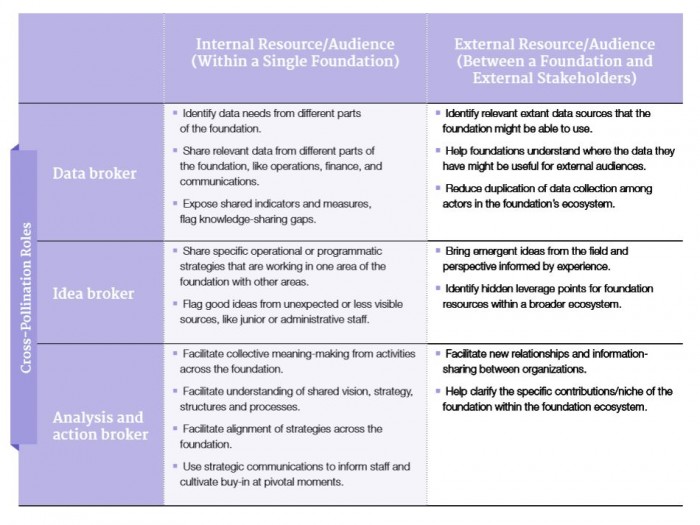In many ways, consultants to philanthropy are like bees, bringing ideas from one source to another for cross-pollination of thinking. Jared Raynor, Ashley Blanchard and Marieke Spence of the TCC Group do an artful job of exploring the particular cross-pollinator role of consultants in their article, “Shine a Light: The Role of Consultants in Fostering a Learning Culture at Foundations,” which appeared in the first-ever Foundation Review dedicated to the art and science of philanthropy consulting.
“Because they work across multiple organizations and frequently touch different parts of the foundation, consultants have the ability to transfer knowledge, ideas, and partnerships,” the authors write. For example, cross-pollination helps to map knowledge, share good practices, foster collaboration and help a foundation learn alongside other organizations. The cross-pollination role of consultants also can bring in a wider diversity of perspectives and ideas that keep a foundation open to constantly learning and considering fresh perspectives and approaches.
As part of their article, Raynor, Blanchard and Spence dive deeper into four ways in which consultants can play important cross pollination roles.
- Consultants can bridge data and ideas that sit in different operational areas of the foundation (e.g., operations, human resources, finance, communications, and leadership). They also connect dots across and within programs. In both cases, cross-pollination is facilitated by the consultant engaging distinct groups and passing information among them. This can expose areas of shared data or knowledge gaps, or translate interesting practices from one part of the foundation to others.
- Consultants can facilitate a process of making collective meaning from information among different groups within the foundation, leading to greater clarity and a more integrated strategy. At a minimum this looks like increased awareness of what everyone is doing. Far better is when facilitation informs a shared vision and engenders institutionwide understanding of organizational strategy and the specific structures and processes that support it.
- Consultants bring external data and players into conversation with the foundation. They share emergent ideas that they see in their work across multiple organizations or facilitate new relationships between those working in similar areas, building connections, and even promoting fieldwide learning.
- Consultants can help foundations understand the strategies of other stakeholders operating in similar systems. They can contextualize the foundation’s strategies vis-à-vis the other players in a particular “ecosystem” – grantees, academia, community organizations, grassroots groups, governments, businesses – helping the foundation learn about its niche, its strengths and challenges, and how to leverage impact on its own or in concert with others. For example, one consultant told us that he felt some of the greatest “value” he’d added to clients had come not from helping them develop a strategic plan, but from more anecdotal conversations with staff and board about how their organization was situated in the larger philanthropic landscape – giving them perspective on trends and peers in the field.
“Cross-pollination roles can be deliberate or ad-hoc,” the authors explain. “While consultants may be hired to do a finite task, they bring with them years of experience working with different funders, privy to all aspects of their operations.”
Raynor et. al. break down cross-pollination by type and audience (internal or external) within their article in the form of a table (see below) that describes consultant cross-pollinators as data brokers who share information, as idea brokers who share ideas, or as analysis and action brokers who facilitate those two activities.
Cross pollination is only one of the roles that foundation consultants can play to help a foundation create a learning culture. For more ideas and insights, download the full Foundation Review article.
This post was adapted from “Shine a Light: The Role of Consultants in Fostering a Learning Culture at Foundations,” written by Jared Raynor M.S, Ashley Blanchard M.S. and Marieke Spence M.A.L.D of TCC Group. This article appeared in first-ever edition of The Foundation Review dedicated to philanthropy consulting (vol. 7, Iss. 1). Click here for this article and other open access articles from this edition.

